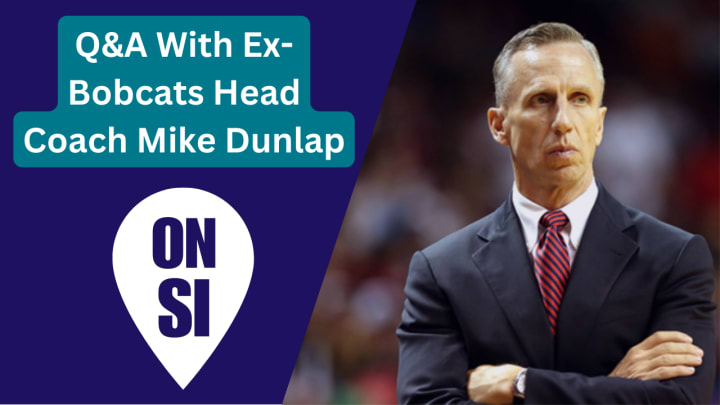Exclusive Q&A | Ex-Bobcats Head Coach Mike Dunlap Reflects On Charlotte's 2012-13 Season - Part 1

After the historically disastrous 7-59 season in 2011-12, the Charlotte Bobcats hired Mike Dunlap as the new head coach to improve the struggling franchise. Dunlap was chosen for his expertise in player development and his ability to create a new team culture. Under his leadership, the team tripled their wins, going from 7 to 21. Despite this significant improvement, Dunlap was fired after just one season.
Dunlap spoke exclusively to James Plowright of Hornets on SI to share some of his memories from that season. In part one of this two part series, Dunlap discusses his first impressions of the organisation, Kemba Walker's breakout year, coaching a young Bismack Biyombo and his memories of working with Michael Jordan.
James Plowright: When you came to Charlotte, they were coming off the historical low point of the lockout impacted 7-59 season. How would you describe the state of the franchise at the time? What were your goals for the season?
Mikes Dunlap: Unsettled, eyes to the floor. Kind of uncertain at at its high point and its low point. The morale was low. It was never said overtly, but our goal was maybe 28 to 30 wins, that would have been the high mark. If we got a little bit lucky and nobody got injured. Unfortunately, Gerald Henderson, who was really pivotal for our team got hurt early in the season and that led to a losing streak (18 games) in my opinion, then once he became healthy again we kind of righted ourselves as witness by coming down the back stretch we started to win in an acceptable way (8-12 in last 20 games).
James Plowright: When you think about the 2012-13 season as head coach, what are some of the words and feelings that can come to mind?
Mike Dunlap: I think for me it was a huge learning curve. I was coming from college and even though I had two years with the Nuggets (As an assistant), when you go into an organisation, college coaches get that jobs or are losing teams that are, you know, you're not going to get one of the premier jobs in the NBA. You're probably going to go into a situation where losing has been part of their culture.
The other thing is you usually get some veteran contracts, better bad contracts with guys that are past their prime. So it's a compilation of learning what an NBA seasons.
"If he (Kemba Walker) puts in the time, he'll be a head coach in the NBA, if that's his desire."
- Mike Dunlap
James Plowright: Kemba Walker excelled in his second year. I remember in pre-season you discussed about "Putting him in position to succeed". How did you do that?
Mike Dunlap: Freedom, we looked at and I was in the Big East, so that helped me. But from the film to understanding how Kemba played in the Big East, you know, he was probably the single greatest player in a historically good conference.
Nobody has performed better in the Big East tournament than Kemba coming into the NBA, and so we tried to investigate how Calhoun coached them and then put him in a position where he had more pick and rolls, he had more possessions that were his. He was our leader. It was a matter of putting him and having him play to his strength. And I think we did a good job of that for.
James Plowright: Did you foresee his (Kemba) future in terms of being a multi time All-Star, All-NBA, or did that even exceed your expectations of him?
Mike Dunlap: No, I always thought that he was a star. At what level? You know, the NBA is an extraordinary league of athletes and obviously you're getting the best of the best from every league in the world, but Kemba definitely had all the trademarks of doing what he did with his career.
James Plowright: Kemba has now taken on a coaching role with the Hornets, did that surprise you?
Mike Dunlap: Kemba could get along with anybody. He could go into the toughest prison in the world and he has a knack of getting along with people and has a wonderful temperament. He's made for the NBA as a coach, he’s a very, very smart person. If he puts in the time, he'll be a head coach in the NBA, if that's his desire.
James Plowright: You put a lot of faith in a young Biyombo, starting 65 games. What was it like to coach a young biz and help him adjust to the NBA?
Mike Dunlap: There were three things about Bismack that were beyond extraordinary. One, he was a student of the game. Two, he always played hard and three was his wingspan. He was an extraordinary pick and roll defender. You know, whatever scheme you asked, he was going to present a problem for your opponent. He was a really good defender and he would get his nose in there. On missed shot rebounding, those were his strengths.
So what we tried to do was play to his strengths and really praised him through his mistakes. He had a tendency to overreact to his mistakes because he felt so bad. I would like to thank over the course of that season we were able to purge him of dropping his head when he made mistakes, because that those mistakes were exactly what was going to help him be a a very good player and last in the NBA.
James Plowright: You are one of very few coaches who have worked for Michael Jordan, what do you remember about him?
Mike Dunlap: What I remember is that whenever he came to practise, it didn't matter what clothes he had on, he would always spend time with the players after playing one-on-one he loved. The competition was what drove them, and while he was playing, whether it was Gerald Henderson or Michael Gilchrist, or Kemba or whomever with his jeans and a nice shirt, he would also teach them things. I'm convinced that he could have been a brilliant head coach even though he didn't have the patience for it.
Michael's intellect and insights to those players made a difference in the entire season of little points that he would give them, and that's what I remember about him that he had. He had really good delivery with them, he made really smart points, like on the pick and roll or how to post up or whatever he was giving them while he was playing them. I thought they were brilliant points, teaching points and so that's what I remember about him.
_____________________________
In part two (Coming soon), Dunlap discusses Michael Kidd-Gilchrist's struggles, challenging personalities on the team, why he was fired and reflects on what he would have done differently.
Read more about the Charlotte Hornets:
Former Charlotte Hornets Guard Jeremy Lamb Announces Retirement
Should Playoffs Be the Expectation for the Hornets in 2024-25?
Why the Hornets Will Be A Must Watch Team on League Pass in 2024-25
